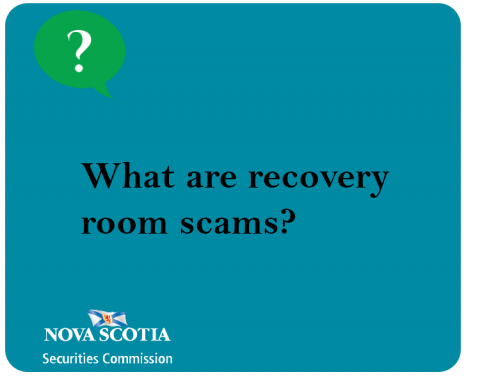Submitted by nsscadmin on

In some of our old posts and content we’ve linked to, recovery room scams have been mentioned. So, what are they and how can they be avoided?
Typically, someone running a recovery room scam approaches people who have been defrauded or scammed. By attempting a recovery room scam the scammer is trying to victimize you again.
Here’s an example of how a recovery room scam might work…..
A few months ago, John lost a few thousand dollars to a scam artist that was running a boiler room. The scammers were not caught and John had lost hope of ever getting his money back. Suddenly out of the blue John gets a call from someone saying they work for a local bank or asset recovery firm. They have tracked down the money that the scammer had stolen from John. The only problem is it’s locked up in an account and a fee is required to obtain it. If John will pay this fee in advance he will get all of his lost money back. To make themselves sound more credible the person from the bank or firm details how John lost his money and how much.
What do you think will happen if John sends his money to this so-called person from the bank or firm? He can add it to the total he’s already lost because he’ll never get any money back. It’s another elaborate scam that tries to revictimize people that are desperate to believe they can get some of their money back.
Some of the hallmarks of a recovery room scam to look out for:
- Someone says they are calling from the Canada Revenue Agency, police, securities regulator or other government organization, or they say they’re an attorney, from a bank, an asset recovery firm or a collections agency.
- They know very specific details about your previous loss despite you having never spoken to them or the organization they claim to be calling from.
- They claim they can get you some of, or even all, your lost money back as long as you pay a fee to “access it,” or “have it released.”
- There is no way to corroborate that they are who they say they are, and that they are with the organization they claim to represent.
If you ever get a call or email or other communication from someone claiming they can get back money you lost, always be suspect. Before giving them any information or sending them any money make sure you know who they really are and who they really represent. Contact your local police, securities regulator, or someone else with the organization they claim to represent and do your due diligence.
